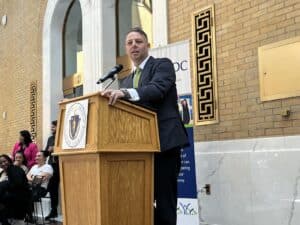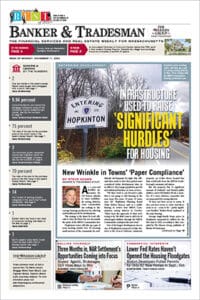
Rep. Jim Arciero, co-chair of the state legislature's Joint Committee on Housing, speaks at the Massachusetts Association of Community Development Corporation's annual advocacy day May 13, 2024. Photo by Sam Drysdale | State House News Service
Community development organizations that aim to support local businesses and low- and moderate-income residents took to Beacon Hill Monday seeking to make permanent a tax credit set to sunset next year.
The community investment tax credit is scheduled to end in 2025, but Gov. Maura Healey’s housing bond bill, which the House is preparing to consider in the coming weeks, would make the credit permanent.
Under the program, qualifying donations to community development corporations can receive a 50 percent refundable tax credit. It was originally set to end in 2019, before former Gov. Charlie Baker signed an extension until 2025.
Since the program launch in 2014, the credit has attracted more than $100 million in private funds for community revitalization.
In the past three years the organizations have used those funds to create or preserve 4,200 homes and 15,000 jobs, and assisted more than 7,200 small business entrepreneurs, according to the Massachusetts Association of Community Development Corporations.
Healey’s bond bill would also boost the cap on donations that qualify for the tax credit from $12 million to $15 million.
Ahead of the housing debate, much of Monday’s event focused on “housing equity” policies such as authorizing local-option real estate transfer fees, the so-called healthy homes program to lead paint and poor air quality in Massachusetts’ housing stock, and Chapter 206 grants to fund first-time homeownership education programs and foreclosure prevention counseling.
“The number one thing we hear about is housing. The number two thing we hear about is housing. The number three thing we hear about is housing,” Lt. Gov. Kim Driscoll told advocates at Monday’s lobbying event. “Even in places where housing might be a bit more affordable, it’s not more affordable to people who are living there.”
CDCs Seek ‘Healthy Homes’ Funding
The community development organizations are advocating for lawmakers to add a $50 million bond authorization onto Healey’s housing bill for the so-called healthy homes program.
This would create a fund to scale up the state’s efforts to address serious health problems caused by substandard housing.
Massachusetts has the second oldest housing stock in the United States, and 70 percent of homes in the state were built before lead paint was banned in 1978. Of the 17 cities categorized by the Department of Public Health as being high risk communities for childhood lead poisoning, 15 are low-income cities with high minority populations, according to MACDC.
“The Healthy Homes Program Fund would help address our aging housing stock and help homeowners address concerns in their home, including dealing with asbestos, mold, pests and lead – especially for the elderly, citizens with disabilities and our young children,” said Rep. Jim Arciero, who co-chairs the Joint Committee on Housing.
The committee favorably reported out a bill to create this fund, filed by Sen. John Keenan and Reps. Manny Cruz and Shirley Arriaga (S.881 / H.1307).
Healey, Driscoll and other members of her administration held a listening session with health care leaders last week – an event they titled, “Housing is Health Care”– in which hospital executives from around the state said patients with unstable housing or poor housing conditions were more likely to experience bad health.
Foreclosure Prevention Program Eyed
Erika Hernandez, executive director of ACT Lawrence CDC, focused her remarks on increasing funding to prevent home foreclosures through Chapter 206 grants.
Last year, the Division of Banks awarded nearly $3 million in grants to 23 organizations to fund first-time homeownership education programs and foreclosure prevention counseling.
“During the last recession, we didn’t have the kind of programs and services that we have today to support education for foreclosure prevention,” Hernandez said. “My family was one of those families like many millions of families across the nation who lost their homes.”
This year, MACDC is asking for $3.5 million to go towards these grants. The House voted to send $2.8 million to CDCs for the foreclosure education program, while Senate Ways and Means recommended $1.5 million in their version of the budget, which will be debated next week.
On another line item community development groups say is crucial, they’d like to see their funding double from Senate Democrats’ proposal. CDCs support small business technical assistance grants, which help local entrepreneurs with startup costs. The nonprofits that administer these grants also provide coaching and training, and helped 6,800 businesses last year.
In fiscal year 2023, the SBTA grant program was awarded $7 million, though it was cut to $5 million in fiscal 2024. Senate Ways and Means would again allocate $5 million to the program this year, while the House opted for $7.6 million.
Sen. Pavel Payano said Monday that he filed an amendment to the Senate budget to steer $10 million to this program, promising to speak about it on the Senate floor during their budget debate next week.
“A recent report from the Donahue Institute at UMass underscores the unique challenges facing small business owners. The report shows that small businesses, particularly in communities like mine, urban communities, communities of color, that they need technical assistance when it comes to navigating local municipal regulations,” Payano said. “In Lawrence, many business owners are eager to grow but face systematic challenges and a lack of access to resources to help them expand.”






